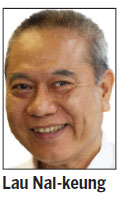'Occupy' is seeking regime change in HK
Updated: 2014-09-30 07:07
By Lau Nai-keung(HK Edition)
|
|||||||||
Hong Kong will never be the same again since the street riots began at 1:40 am on Sunday. While the situation is changing by the minute, here are the major points of note as of the Monday morning.
Firstly, the most significant development with "Occupy Central" is that it appears to have become "Occupy Government Headquarters". While this may appear a natural development of things after the class boycotts outside Tamar Park in Admiralty, the new target gave the "Occupy" movement a perfidious twist. Unfortunately, few have discussed this key change of direction, and many participants were not aware of what they were actually doing.
The original plan for "Occupy Central" involved disrupting business activities in Central, the city's central business district. As recently as a May interview, Benny Tai Yiu-ting was still referring to the movement as "participants taking to the roads in Central to block traffic." At that time he also added that "if the government refuses to accept our proposals, we will resort to civil disobedience acts and that's the 'Occupy Central' that we're talking about, that we will occupy not just the open space under the HSBC but we will actually occupy the streets." He then clarified "not all the streets in Central, but maybe one or two main streets causing some sort of disturbance to pressure the government into accepting our demands."
If Benny Tai occupies the HSBC building resulting in financial losses for the bank, I am sure he will soon be hearing from HSBC's lawyers. Will that prompt HSBC to pressure the government into accepting Tai's demands for "true democracy"? Perhaps, but I cannot see a logical connection between the occupation of the HSBC building and the need for the government to respond to Tai's demands. That's precisely why nobody took the original ideals of the "Occupy" movement seriously.

"Occupy Government Headquarters" is altogether a different matter. It is a direct challenge to sovereignty. The government can survive the HSBC building being occupied for a couple of days, but not the government headquarters. The symbolic nature of losing control of government headquarters would be too much. No government can allow that risk, including ours. It is perfectly understandable that the government do whatever it must to protect the government headquarters, including the use of tear gas.
To make matters worse the "Occupy" movement is now leaderless. "Occupy" co-founder Chan Kin-man said those that stormed onto Harcourt Road and Connaught Road Central were "not under their control". Chan said "their actions were not organized by us." Similarly, the Hong Kong Federation of Students urged protesters to retreat, citing concerns the police might escalate their use of force, but few followed their advice.
In a leaderless movement, no one takes responsibility for the actions of protesters, and there is nobody with whom legitimate authorities can negotiate.
To create this highly decentralized form of collective action a great deal of preparation and manipulation is necessary. In this regard, the dissidents' execution has been flawless. But this will have grave consequences.
I must also note that the protests have hardly been peaceful, and therefore police actions have been entirely justified. Radicals were charging with umbrellas before the police resorted to tear gas. The fact that protesters were holding hands in the air was no guarantee their protests were peaceful. There were reports they kicked police officers as cameras were focusing on the hands in the air. The truth is they looked very much like zombies in movies when they charged slowly with their hands up. The police were exhausted and stressed. We should applaud them because so far, miraculously, nobody has been seriously injured.
The "Occupy" movement increasingly resembles an attempt at regime change. What would have happened had the dissidents successfully occupied the government headquarters? Would they then have given Chief Executive Leung Chun-ying a public trial? After the first day of confrontation, the movement is transforming into a protracted struggle. The next key issue will be who errs first and loses the public sympathy? - The police or the protesters.
No matter how it turns out, political polarization will get worse. Hong Kong now has two worlds, and two realities - one in which the government is "evil" and the other in which the dissidents are crazy. This will have a considerable impact in the coming decade.
The author is a veteran current affairs commentator.
(HK Edition 09/30/2014 page5)